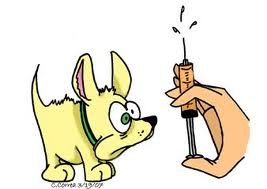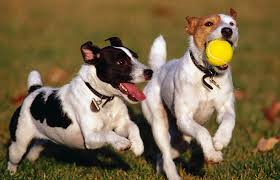Dog vaccinations have revolutionised control of infectious disease in our pets. It is essential that all pets are adequately vaccinated to help protect the pet population as a whole. Responsible pet care requires puppies to be given their initial course of vaccinations, but this cannot protect them for the rest of their lives. Adult dogs require regular vaccination to maintain immunity against disease. We are often asked what we vaccinate against, how often it should be done, is it really necessary (our dog isn’t going into kennels) and what do I do if I don’t want to vaccinate? We hope this information helps clear up some of the more common queries, but please feel free to contact us at the clinic if we can help any further.

What do we vaccinate against?
There are commonly five diseases that are covered by routine vaccination, these are:
Distemper – a viral disease that can affect dogs of all ages. Early signs of the disease can be a high temperature and lethargy which may be accompanied by discharge from the eyes and nose. Many dogs will also develop muscle spasms, convulsions and paralysis – permanent brain damage and death may result. Luckily distemper is not as common as it was in the past, due to the availability of highly effective vaccines. However, outbreaks of distemper do occur in areas where vaccination rates are low so we can’t afford to become complacent.
Infectious hepatitis – a highly contagious viral disease caused by canine adenovirus. It can be particularly severe in young dogs and is often fatal in puppies. If an infected animal survives it may continue to shed the virus in its urine for up to 6 months. Affected dogs will often have severe abdominal pain, due to an inflamed liver, fever and loss of appetite – death may occur within 36 hours.
Parvovirus – a highly contagious viral disease which affects the intestinal tract of dogs. The virus is shed in faeces and vomit but because the virus itself is very hardy it can survive for 6-12 months in the environment. It is commonly encountered in places of high dog traffic such as parks, beaches and showgrounds. Parvovirus can also affect foxes so may be seen on rural properties even in the absence of other dogs. After exposure to the virus dogs will often develop a fever and ultimately severe vomiting and diarrhoea (often containing blood). If successful, treatment usually involves several days of intensive hospital care but unfortunately this disease carries a high mortality rate. Vaccination is very effective in preventing this disease.

Canine Cough – primarily caused by two organisms: Bordatella bronchiseptica and canine parainfluenza virus. Canine cough is a contagious disease that is often caught when dogs are socialising or sharing airspace such as: kennels, groomers, obedience classes, parks and communal water bowls. The main symptom is a harsh hacking cough that may end in gagging, dogs can experience reduced appetite and a fever. Symptoms may persist for many weeks despite treatment. Although not usually considered to be a fatal disease it is highly unpleasant and can cause death in very young or debilitated patients. There are 2 methods of vaccinating against Parainfluenza and Bordatella, an injection or an intranasal spray. At Vasse Vets we use the intranasal kennel cough vaccination where a small amount of liquid is trickled down the nostrils. This vaccination has been shown to be stronger and faster than the injectable version. Also, because the immune response is localised in the nose, this vaccine is preferred for dogs that have had previous vaccine reactions.
How often should we vaccinate our dog/puppy?
Puppies are ‘temporarily’ protected against many diseases by antibodies received through their mother’s milk. These maternal antibodies decline in the first few months of their lives, however until they drop sufficiently they can also neutralise vaccines. This is why a series of vaccinations is necessary in a puppy.
Here at Vasse Vets we understand that early socialisation is beneficial for your puppy so we offer an early finish vaccination at 10 weeks of age. This vaccination can be used regardless of your puppies previous vaccinations and means that you can get your puppy out and about sooner!
At Vasse Vets our early finish protocol is as follows:
- 1st Vaccination at 6 weeks (Distemper, Parvovirus and Hepatitis)
- 2nd Vaccination at 8 weeks (Distemper, Parvovirus, Hepatitis, Parainfluenza and Bordatella)
- 3rd vaccination at 10 weeks (Distemper, Parvovirus and Hepatitis)
- Annual booster followed by three yearly C3 and annual kennel cough booster
Puppies only require one vaccination to attend Puppy School so book in quickly! It is important to note that dogs will be required to be up to date with their vaccinations in order to be accepted into boarding kennels. We advise that this is done at least two weeks prior to boarding as it gives a chance for the immune system to respond to the vaccine and therefore provide adequate cover.
Is vaccination really necessary?
At Vasse Vets we cannot recommend routine vaccination strongly enough. The immunity from puppy vaccination weakens over time and your pet can again become susceptible to disease. It is not only important for your dogs own safety but it helps protect those that are too young or have illnesses that prevent us from being able to vaccinate them. Futhermore, insurance companies are unlikely to cover costs of treating a disease that can be vaccinated against and most boarding kennels require your dog to be up to date with their vaccinations.
Annual health checks and booster vaccinations as required, will provide the best protection for the life of your pet. To prevent over-vaccination we use a three yearly C3 vaccination (Parvovirus, Distemper and Hepatitis) and a yearly kennel cough vaccination.
Although we use a three yearly C3 vaccination, it is still important to bring your dog in for annual health checks and annual kennel cough booster vaccinations.

My dog never mixes with other dogs is vaccination still necessary?
As discussed above, some viruses can be carried on clothing and some by wild animals, therefore, your dog is still at risk. In fact, if your dog is not mixing with other dogs/going to public places it removes any chance for its immune system to be rechallenged and create any natural immunity. As a result your dog may in-fact have lower immunity than the socialite that attends all the doggy functions.
I still don’t want to vaccinate my dog, is there anything else I can do?
Although we strongly recommend vaccinating your dog, as we have seen first hand the horrors of parvovirus and the ongoing discomfort of canine cough, we respect there are some people that have reservations. If you are strongly opposed to the thought of vaccinating we can take blood samples to check your dogs antibody levels to parvovirus and distemper and vaccinate only if the antibody levels are low (there are no current tests available for canine cough or hepatitis). Please feel free to discuss this with us during your dogs check up.
Most Kennels are unlikely to accept this is as sufficient cover for boarding.
What will my dog be like after a vaccination?
Following vaccination your dog may be off-colour for a day or two, or have some slight swelling or tenderness at the injection site. Access to food and water and a comfortable area to rest are usually all that is required for a quick recovery. However, if the response seems more severe, you should contact us for advice. If your pet has had an adverse reaction to vaccinations previously please let us know so we can appropriately manage your pet and reduce the risk of another reaction.
Please give us a call on 9755 4455 or email us using the form below to discuss a suitable vaccination regime for your pet puppy or dog!
Click here for more information on cat vaccinations and keep the whole family protected!


